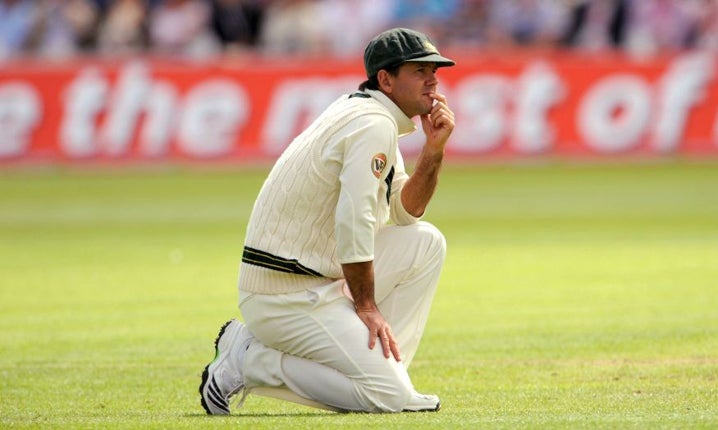The Australian angle: Ponting's tactics let home side off hook

Your support helps us to tell the story
From reproductive rights to climate change to Big Tech, The Independent is on the ground when the story is developing. Whether it's investigating the financials of Elon Musk's pro-Trump PAC or producing our latest documentary, 'The A Word', which shines a light on the American women fighting for reproductive rights, we know how important it is to parse out the facts from the messaging.
At such a critical moment in US history, we need reporters on the ground. Your donation allows us to keep sending journalists to speak to both sides of the story.
The Independent is trusted by Americans across the entire political spectrum. And unlike many other quality news outlets, we choose not to lock Americans out of our reporting and analysis with paywalls. We believe quality journalism should be available to everyone, paid for by those who can afford it.
Your support makes all the difference.Ricky Ponting's limitations as captain were exposed on an increasingly entertaining opening day played on a supine surface. After the visitors had taken three unexpected wickets on a patchy morning, all Australia expected their captain to spare no bones in pursuit of further scalps. As much has been the antipodean tradition since Fred Spofforth first glared at an English toff. After all it was the first day of an Ashes series, not a time for holding back. Everyone could remember the explosive exchanges at Lord's in 2005, outbursts that set the tone for the campaign. Every 20 minutes or so a wicket fell or a batsman was hit on the head. It was great stuff. But, then, the pitch was firmer and the venue more inspiring.
In the first session yesterday, Ponting had seemed to be at his sharpest, reacting quickly to Kevin Pietersen's arrival at the crease, tossing the ball to his fellow Tasmanian by way of executing a plan. For that matter his decision to include Ben Hilfenhaus had been justified by the brickie's unstinting work. Ponting has always been a good judge of a cricketer. An independent thinker, he had also chosen his spinner. Dismayed to lose the toss, the Australians were relieved to take lunch with English backs to the wall.
Far from seeking a fourth wicket, though, the tourists went into their shell after the break, relying for an eternity upon presentable spinners sent down by a specialist and a part-timer. Accordingly Pietersen and Paul Collingwood were able without any particular difficulty to rebuild the innings with sweeps and dabs to cover, shots indicating a reluctance to drive on a grudging deck. Inexplicably, Nathan Hauritz was retained for 14 overs. Presumably Ponting felt obliged to support him and the tactic was overdone. No wickets fell, or looked like falling, for two hours and still he did not intervene. Hilfenhaus was not called upon all afternoon. Upon his reappearance he produced the spell of the day, and was unjustly denied Pietersen's wicket.
To make matters worse, Ponting used his spinner at the wrong end. The Australian speedsters must have been crying out for a chance to bowl at the River End. Hilfenhaus and Mitchell Johnson did their best work with the Taff at their back. As the dangermen, they deserved choice of ends. Admittedly the wind was sweeping across the ground but that merely confused the issue. None of the pacemen looked comfortable from the Cathedral End.
Nor did Ponting put any pressure on the fourth-wicket pair, sending three and sometimes four men to protect the boundary, allowing the batsmen to play themselves into form with singles. It did not seem much of a way to start an Ashes campaign. Allowing England's batsmen to find form was a huge concession. Australia were dangerous only in the periods when the bowlers produced the aggression missing in the pitch.
Perhaps Ponting was trying to push along the over-rate, or else waiting for the ball to start "reversing". Not that reverse-swing worked. Australia had lost their leading practitioner, Brett Lee, to injury and it soon became apparent that Peter Siddle lacked the required control. From a distance it seemed they prematurely loosened their slender grip. At a vital time easy runs were conceded, and no attempt was made to break the pattern.
If the morning belonged to the visitors, though, and the afternoon to England, the antipodeans did rally in the final session. Hilfenhaus deservedly ended Collingwood's industrious innings.
At last Hauritz changed ends whereupon he provoked an indiscretion from the local champion. Although he unfurled some wristy drives, Pietersen was below his best and at times his footwork was clumsy. Australia persevered and by the end of an ever more compelling day England was only marginally the happier side, with runs on the board and a long match looming..
Join our commenting forum
Join thought-provoking conversations, follow other Independent readers and see their replies
Comments